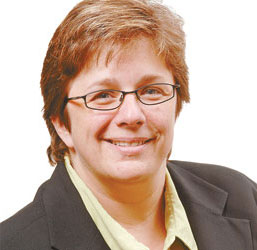Digital world changes rules of journalism
The online news environment has made life much more complicated (and interesting) for members of the media. Skills are needed now that weren’t even thought about, let alone considered necessary, even a decade ago.
So says Andrea Muirragui Davis, Web editor of the Indianapolis Business Journal and Ball State University alum. The work environment has changed entirely since her earliest days at the IBJ.
“The online environment has completely changed our jobs,” Davis said. “When I started here almost nine years ago, we were a weekly newspaper. Period.”
In Davis’ early days the decisions on what to do when news broke were fairly simple: The newspaper sent reporters to cover the story for print in the next issue. With so many ways to break news now, whether it be the IBJ Web site or through a social-media outlet like Facebook, things grow more murky.
“Now when news breaks we have a lot more decisions to make,” Davis said. “Is this a story for print or online? Should we wait for [the daily news e-mail we send] or send out a breaking news e-mail? If we break the story online, is there some fresh angle we can address in print? Should we send out a tweet about the story? Post it on our Facebook page?”
With so many different ways to cover stories and break news, IBJ has been forced to become much more flexible with its reporters in order to maximize their news coverage.
Doing more with less
“We…have to deal with a question of resource allocation,” Davis said. “We have added industry-specific e-mails and blogs and lots more online reporting, [but] we have not added reporters. So we have to figure out how to do more with less, without affecting the quality of our print product.”
Davis said that while Ball State prepared her as best it could for the challenges she now faces, the nature of the new media environment prevents any school from being able to truly prepare its students for everything they will see. For instance, the Internet was relatively new when Davis was at BSU, and wasn’t used to the near-constant degree it is now.
Davis feels students should focus their education on learning every practical thing they can, thereby making themselves more marketable and able to adjust on the fly.
“Technology is changing so fast, I’m not sure it is possible to teach students everything they’ll need in their careers,” Davis said. “I’d like to see Ball State and other universities offer more non-credit opportunities for graduates—specialized reporting or multimedia classes, for example.”
Davis said she is impressed with the ever-changing environment at Ball State, not least with a particular change that on-campus students enjoy.
“I’m impressed what I see coming out of Ball State, and I’m sure I will continue to be proud as it keeps growing,” she said. “The changes in the dining halls are incredible. I might have actually eaten there if they’d been that cool back in the dark ages.”




